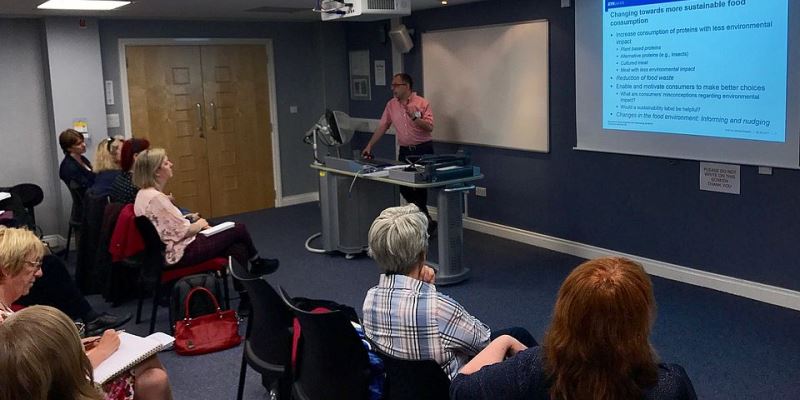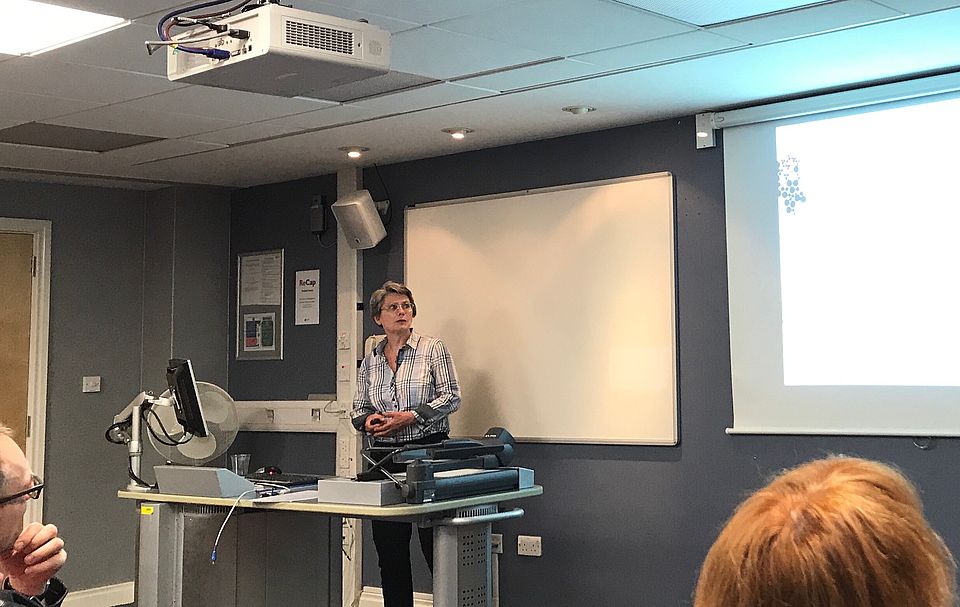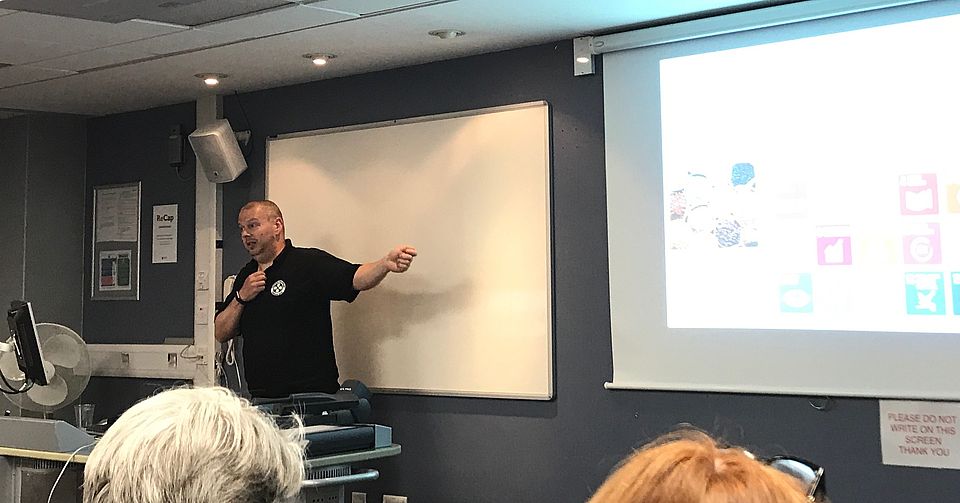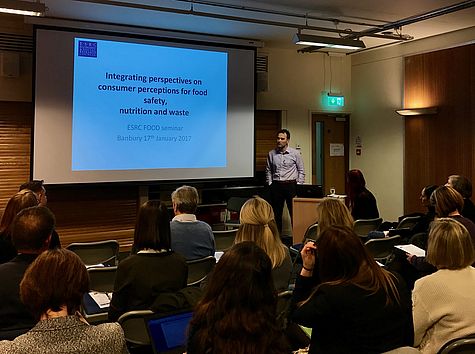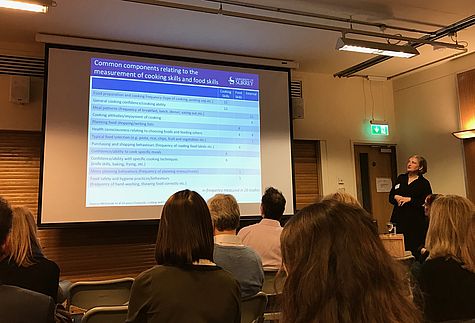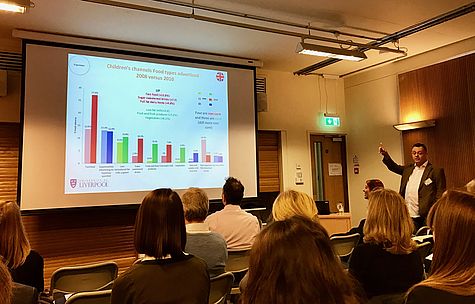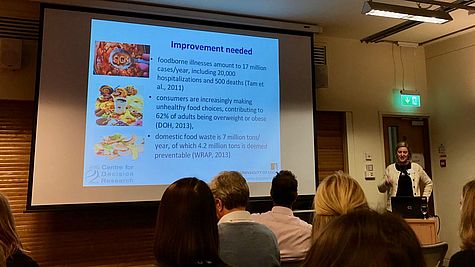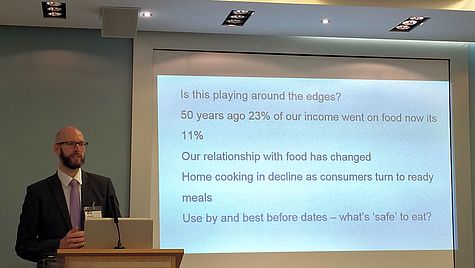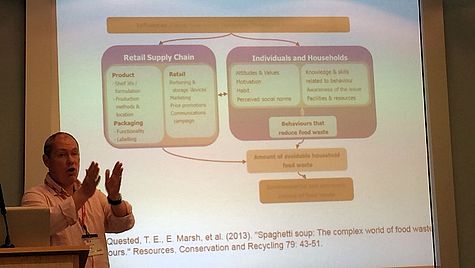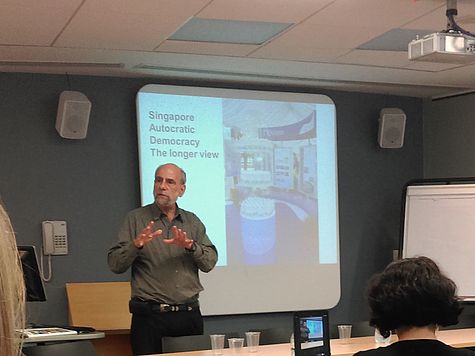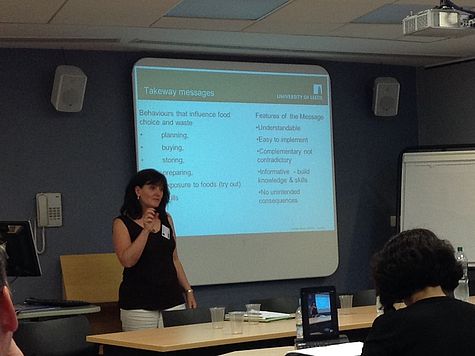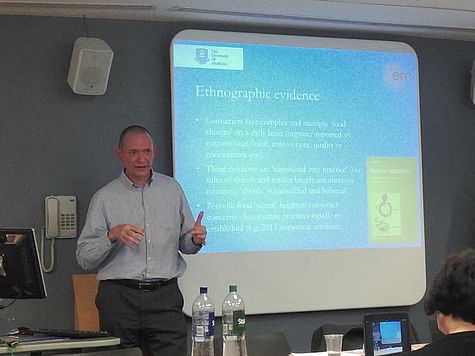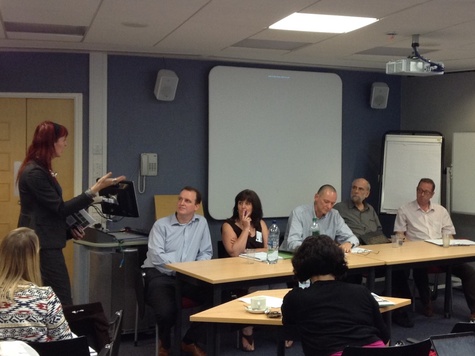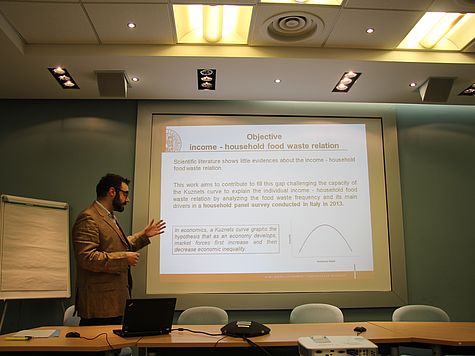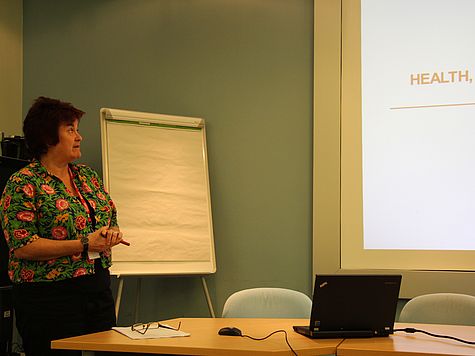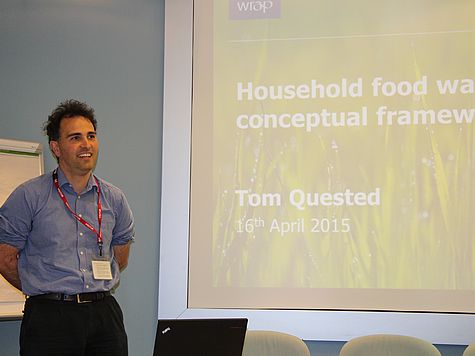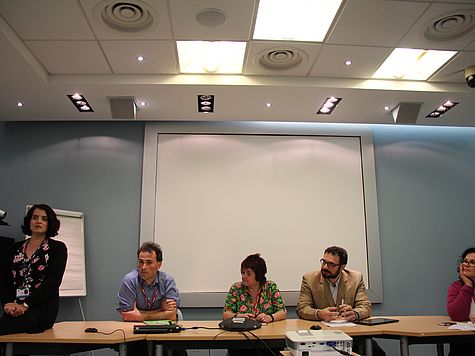Food Options, Opinions and Decisions
ESRC Funded Seminar Series on Food Options, Opinions and Decisions (FOOD): Integrating perspectives on consumer perceptions of food safety, nutrition and waste
Summary

Our seminar series aims to understand and improve UK consumers’ decisions about nutrition, food safety, and domestic food waste. Our goals align with DEFRA, the Food and Agricultural Organisation and others who use the modern view of ‘food security’ for developed countries, by defining it as access to food that is nutritious, affordable, safe, and sustainable, while producing minimum domestic waste. Better food safety and reduced food waste are high priority for the EU.
Improvement is needed because 1) In the UK, foodborne illnesses cause 20,000 hospitalizations and 500 deaths per year. 2) Food safety warnings can cause undue alarm, increase food waste, and undermine healthy choices. 3) UK domestic food waste is 7 million tonnes per year, of which 4.2 million tonnes is deemed preventable. 4) Perishable foods are more nutritious but may affect food safety and food waste; 5) unhealthy eating is contributing to 62% of UK adults being overweight or obese.
Our seminar series is timely and novel because it follows calls to better understand and inform the complex decisions consumers face about nutrition, food safety, and food waste. We take the important step of bringing together practitioners and academics who have mostly been working separately in these domains. Through 9 seminars to be held over 3 years, we will create a lasting network. We have invited academic and practitioner speakers from across the UK and overseas who are key experts in the relevant domains. Seminars will be hosted and promoted by participating agencies and universities.
Our co-investigators and project partners include practitioners at the Food Standards Agency which aims to improve food safety and healthy eating, as well as at the Waste and Resources Action Programme (WRAP) which aims to reduce food waste. We will fund the travel of early career researchers to promote their inclusion. We will give expert elicitation surveys to seminar speakers and participants, so as to systematically record and represent their views. The survey will be on our project website so that anyone not in attendance can also respond. Our project website will be linked to participating organisations and will also have information for academics, users, and consumers about how to promote better nutrition, food safety and food waste. The PI and her team of users and academics will build on their international connections to promote the seminars and findings to academics, users and consumers worldwide.
Objectives
1. To inform future research and practice by identifying strategies for helping consumers to achieve nutritious food choices that both improve food safety and reduce food waste.
2. To grow a lasting network of users and academics in 9 seminars over 3 years, so as to
- Give users from different agencies the opportunity for regular contact over a sustained period of time (such as Food Standards Agency, WRAP, DEFRA, and others), by serving as speakers and seminar participants.
- Allow users to interact with international academics from behavioural decision research, risk communication, psychology, sociology, environmental and food science.
3. To use our seminar findings to generate output, outreach, and dissemination, including
- Joint review papers that aim to inform theory and practice in the relevant domains.
- Joint research proposals involving users and academics, with the goal of developing and testing evidence-based interventions, whilst recognizing that food safety and food waste are top priorities for EU Horizon 2020, the Biotechnology and Biological Science Research Council (BBSRC), and other funding organisations.
- A publicly available website, which will provide resources emanating from the research series, including recordings and presentation slides for academics, users, and consumers.
- Presentations at workshops targeting academics and policy makers who aim to help consumers with decisions about nutrition, food safety and food waste.
The Co-investigators on this project are a cross disciplinary team based at the universities of Leeds and Newcastle, WRAP (Waste Resources Action Programme) and the FSA (Food Standards Agency) in the UK. The team is Professor Wandi Bruine de Bruin(PI), Dr Nicola Bown (co-director of the seminar series) and Dr. Gulbanu Kaptan (co-director of the seminar series) at the Centre for Decision Research (CDR), University of Leeds, Professor Louise Dye from the Human Appetite Research Unit (HARU) at University of Leeds, Professor Lynn Frewer of the Food and Society Group, School of Agriculture, Food and Rural Development, Newcastle University, Dr Tom Quested from WRAP and Dr Sian Thomas from the FSA.
If you would like to be added to the distribution list to receive information about the seminar series, please contact research.LUBS@leeds.ac.uk.

Seminar 9: 12 September 2017 – Facing the future of food
Our last seminar in the ESRC FOOD seminar series took place on Tuesday 12 September at Leeds University Business School, focusing on the topic of “The Future of Food”. With approximately 70 attendees and some very engaging speakers, the event was a great success.
Dr Nicola Bown, University of Leeds, gave an overview of the seminar before introducing Professor Hannelore Daniel, Technical University of Munich, who delivered a presentation on the interplay of the genome with dietary factors, including concepts of “personalised nutrition”. You can view the slides here.
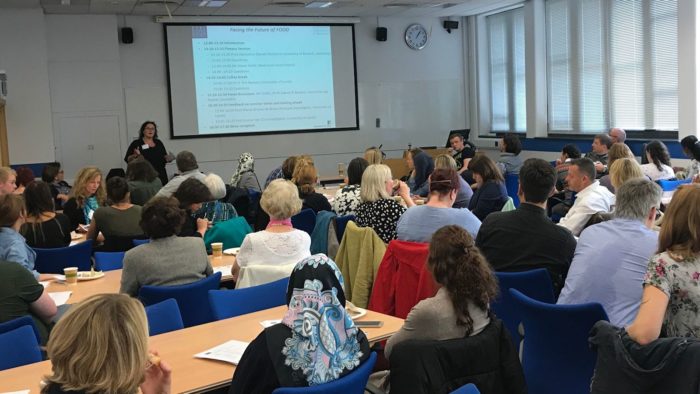
Dr Nicola Bown welcoming everyone
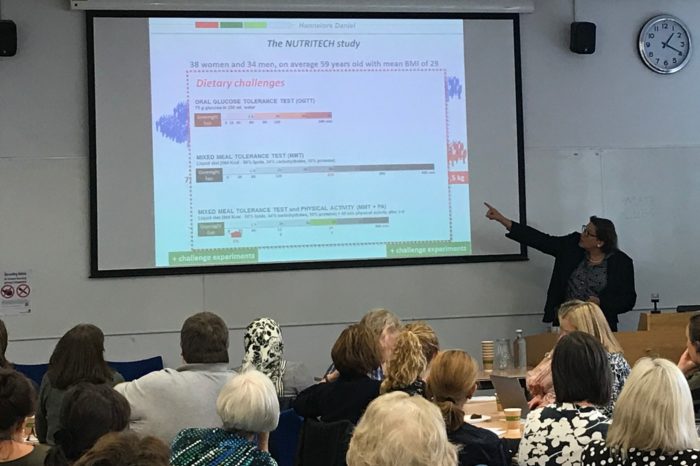
Professor Hannelore Daniel
Professor Daniel was then followed by Adam Smith, founder and co-director of The Real Junk Food Project. Adam gave an inspiring talk on the need for The Real Junk Food Project and Fuel For School, outlining the current situation surrounding avoidable food waste.
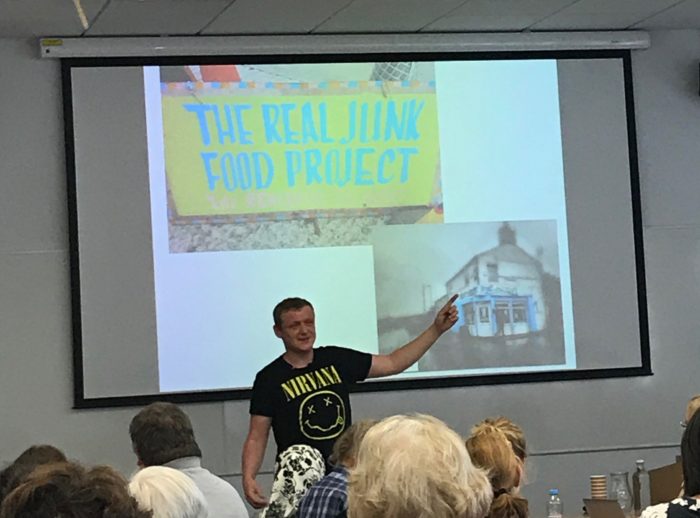
Adam Smith
Following a coffee break to allow time for networking, Professor Tim Benton, University of Leeds, delivered a presentation on why our food systems need to change. You can view Professor Benton's slides here..
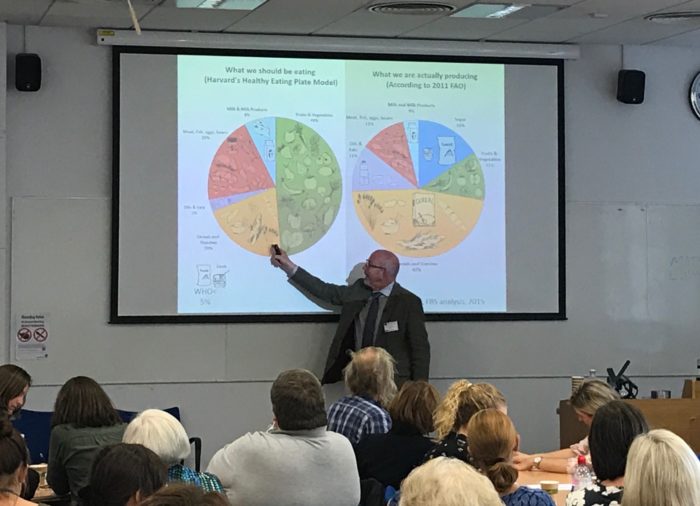
Professor Tim Benton
All our speakers then joined a panel discussed chaired by Jay Rayner, journalist, food critic and musician. Taking questions from the audience, the panel had a lively discussion about the various issues surrounding the future of food.
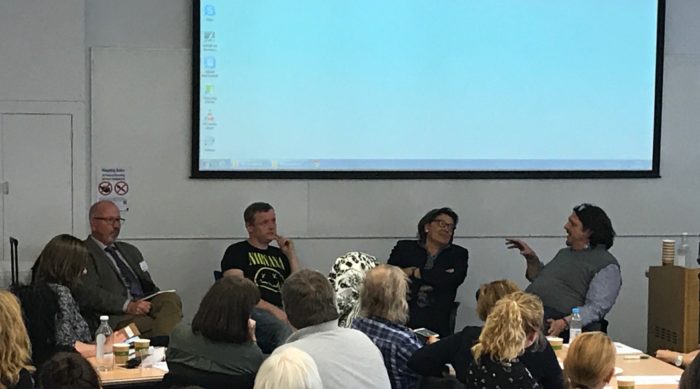
Panel discussion chaired by Jay Rayner
Rounding up the event, Professor Wändi Bruine de Bruin, University of Leeds, gave a presentation summarising the seminar series (view slides here) and Professor Louise Dye, University of Leeds, discussed how the series could be developed further through the N8 AgriFood project (view slides here).
Practising what we preach, none of the food ordered for lunch and the reception went to waste. Business School colleagues and PhD students came to help themselves to leftovers, meaning we weren’t left with any food waste after the event!
You can watch videos of our speakers below.
Seminar 8: 2 June 2017 - Food security and novel food solutions: implications for food choice, safety and waste
The penultimate seminar in our series focused on “food security and novel food solutions: implications for food choice, safety, and waste.”
Hosted by our colleagues in the School of Agriculture, Food and Rural Development, the event was held at Newcastle University on Friday 2 June and featured three speakers as well as a panel discussion and reception afterwards for networking.
Professor Michael Siegrist, ETH Zurich, Switzerland, was the first speaker. He discussed: the relationship between sustainability and food, how food can be more sustainably produced in future, why it’s important, how consumers perceive the sustainability of various foods, and what our measures are towards more sustainable food consumption. He raised the topic of insects for consumption, not only the question of consumers’ acceptance, but also of their production, and also discussed cultured meat and the various environmental impacts different meat production has.
Professor Siegrist noted the importance of understanding consumers’ knowledge of the environmental impact of foods and then looking at consumers’ motivation, rather than treating both points as if they were the same. He gave an overview of one of his recent studies investigating consumer’s understanding and how best to communicate the environmental impact of food productions. He concluded that the impact of meat consumption on the environment is severely under-estimated, and that consumers over-estimate the impact of some other aspects such as the production method and distance the food is transported. You can view Professor Siegrist’s slides for further information.
In particular, Dr Kuttschreuter focused on the significance of social media in facilitating informed decision making in relation to new food products. She gave an overview of her recent studies, exploring social media channels and also web-browsing behaviour. For more information, view Dr Kuttschreuter’s presentation slides.
The final presentation was made by Dr Gavin Stewart, Newcastle University. He focused on the importance of evidence synthesis in conducting food-related research. Gavin discussed the need for academics to reconsider how they collect and present evidence, particularly with regards to (over) reliance on P values and publication bias. He suggested ways to overcome these issues, for example, reporting and interpreting effect sizes and confidence intervals, adhering to reporting guidelines, preregistration, open data and open access. You can read his presentation slides here.
The speakers were then joined by Angela Booth, AB Agri Director of Feed Safety, for the panel discussion, chaired by Dr Sharron Kuznesof, Newcastle University. Taking questions from the audience, the panel and delegates discussed: who are the agents of change; how do the different areas (health, safety and waste) trade off each other and is there a priority; how to communicate the issues to consumers; the need to make food security more prominent in consumers’ minds; how the topics are political issues; how much responsibility lies with the consumer; the customer perception of quality and safety; and whether food waste is a market failure.
The next seminar will take place on Tuesday 12 September 2017 at the University of Leeds.
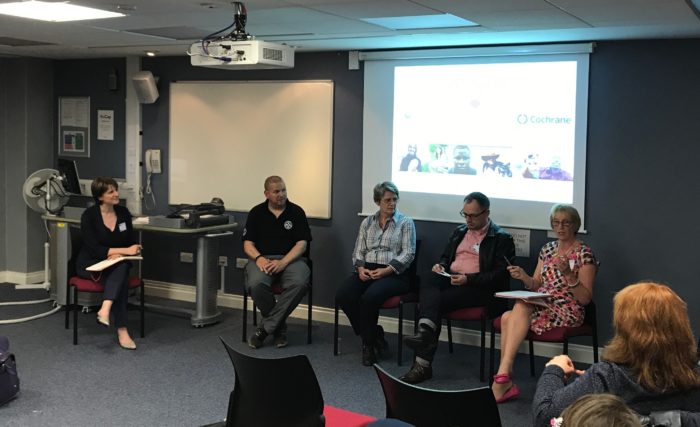
From left to right: Sharron Kuznesof, Gavin Stewart, Margot Kuttschreuter, Michael Siegrist and Angela Booth
Seminar 7: 17 January 2017 - Integrating perspectives on consumer perceptions for food safety, nutrition and waste
The 7th seminar in the series was held at Banbury Museum on Tuesday 17 January 2017. The theme of this seminar was "Integrating perspectives on consumer perceptions for food safety, nutrition and waste".
This is the second time the seminar was held in Banbury, home to WRAP (Waste and Resources Action Programme). Dr Tom Quested, Research Analyst at WRAP and one of the Co-Investigators for the series, introduced the event. He gave a brief overview on WRAP and its work on waste and trying to get the most out of our resources. He explained how the company is trying to make change happen, focussing on food, clothing and electricals.
Professor Monique Raats from the University of Surrey gave the first presentation. Giving examples of her own work, colleagues’ research and other projects, Professor Raats discussed: how the sciences (both social and natural) can get used in policy; work on reviewing nutritional guidelines; different patterns in behavioural advice; the new Eat Well guide which refers to sustainability; food and cooking skills; barriers to healthy shopping and sustainable eating; perceptions of cooking from scratch; the idea of creativeness and what that means in relation to food; food space (where people eat inside the house and communal areas); the consequences of transient populations and the effect this has on waste; and the Richfields project – a new project involved in thinking about research infrastructure. The Richfields Project considers data generated by consumers, the business world and researchers, and what the barriers are to sharing data between these three groups. You can view Professor Raats' presentation here.
Next, Professor Jason Halford, University of Liverpool, presented his research on marketing food to children – the messages and their impact. He discussed the key reasons brands marketed to children; how children engage with media, but not necessarily child-specific media; the effect (or lack of it) that the OfCom regulations had on children’s eating patterns, and the power of promotional characters. Questions from the audience led to discussions on how can you brand fresh products like fruit; whether research had been conducted on what characters in sitcoms eat; how there are more food related activities in life such as going to the cinema; and TV normalising a particular behaviour and reinforcing class stereotypes and social norms. You can see slides from Professor Halford’s presentation here.
The final speaker was Dr Gulbanu Kaptan, one of the Co-Investigators for the seminar series. Dr Kaptan’s presentation focused on integrating perspectives on consumer perceptions of the three focus areas (food safety, nutrition and waste.) She discussed why food security is so important and how it is relevant to the theme of the seminar. She then provided an overview of a study (undertaken by University of Leeds Co-Investigators of the seminar series) exploring consumer perspectives. The study aimed to summarize experts’ views on consumers’ understanding of the interactions between the domains of food safety, nutrition and food waste, and their relevance for informing consumers’ decisions. Dr Kaptan noted that expert advice in the study included a tendency to shift some responsibility from consumer to industry e.g. addressing issues earlier in the production line. You can view slides from Dr Kaptan’s presentation here.
The discussion that followed included questions about tailoring messages for different audiences; consumers becoming desensitised to messaging; the need for messaging to be continual; how consumers need to be shown rather than just told (e.g. having a dietician go round the supermarket with them); confusion when messages change depending on the progress in science (e.g. fats being ‘bad’ for you, but now the focus is on sugar); tried and tested approaches to food safety rather than knowing the facts.

For the panel discussion, the three speakers were joined by Dr Angela Meah from the University of Sheffield and Dr Bojana Bajzelj from WRAP. The following questions and thoughts were raised during the panel discussion:
- A lot has been done about communicating the facts but there still does not seem to be much behaviour change. Messaging is important but there needs to be a change in products, habits and environment
- How much of this is a middle class discussion? The communications and actions need to be tailored towards different groups with different priorities e.g. middle income families focussing on restriction whereas lower income families focussed on preventing hunger
- The priority for food banks; providing food that will keep safe
- Whether the focus of waste is mainly on food waste, or also the waste of packaging and supply chain sustainability
- Junk food projects: reducing waste, putting the responsibility on the consumer, intercepting and facilitating, lack of traceability, social stigmas.
- There is an urgency for all these issues to be addressed but how likely are politicians to back campaigns and changes in behaviour that take a long time to see results?
- Is there a loss in skill now when it comes to food – not just cooking (the skills to be creative and create multiple dishes from limited ingredients) but also in purchasing – knowing whether fruit is ripe or not for example.
Discussions were continued afterwards during the wine reception. The next seminar will take place on Friday 2 June at Newcastle University.
Seminar 6: 30 June 2016 - The role of supermarkets in consumer food choices and sustainable strategies
The 6th seminar in the series was held on Thursday 30th June 2016 at the Food Standards Agency (FSA) in London. This was the second time a seminar was held at the FSA.
Focusing on the role of supermarkets in consumer food choices and sustainable strategies, the event started with a presentation from Craig Noonan, Head of Retail PR at the Co-operative.
Craig discussed the fact that there is a lot of media coverage about who is to blame for food problems (such as poor health) and that there doesn’t seem to be a general consensus. There’s currently a lot of concern about over-processed foods and seems to be some confusion about messaging surrounding sugar and fat content. Craig stated that there are a lot of things that supermarkets can do and a lot of good work that’s going on already. He said that it all came down to three things: price, promotion and product.
Craig talked about other ideas such as whether it’s the supermarkets’ responsibility to ban certain products (for example, the Co-op has placed a ban on alcopops) and how reformulation (such as removing sugar from a lot of cordials) is another area that the food industry is focussing on.
Craig’s ideas for ways that supermarkets can help, or are already helping, included: putting healthier food options on promotion; using clear labelling systems; adding health and waste messaging on packaging and receipts; working with other relevant organisations like WRAP to use voucher schemes; improving store procedures such as stock rotation to reduce waste and helping to educate people about their food choices.
After the presentation, there was time for questions which included discussion on how much should supermarkets should be ‘nudging’ consumers (persuading them to make certain choices e.g., through point of sale, messaging on receipts or voucher codes) or how much focus should be on educating the consumers so that they have the knowledge to make informed decisions when it comes to food waste, health and safety.
Professor William Young, Professor of Sustainability and Business at the University of Leeds and Co-Director of the Sustainability Research Institute, then gave a presentation on his research with Asda investigating reducing food waste at home.
The three year project focused on what type of interventions can help consumers change their behaviour with regards to food waste. The team used social influence theory – when emotions, opinions or behaviours are affected by others – in their research. They used a Facebook campaign, Asda Life Magazine, an e-newsletter, a schools toolkit, on-pack stickers and an in-store event as ‘behaviour change interventions’, focusing on waste reduction messaging (e.g., advice for making the most of highly wasted product lines).
There were a number of findings. For example, customers with higher food waste said they saw the interventions and responded to them, and regular interventions are needed to keep food waste low.
After time for questions following William’s presentation, there was then a panel discussion. As well as the two speakers, the panel also featured, Ylva Haglund from Zero Waste Scotland, Deborah David, a dietician who works with community groups, and Kieron Stanley from DEFRA.
There was a lot of discussion regarding whose responsibility it is to help reduce food waste (parents, teachers, supermarkets, government etc.) and the fact that there isn’t a “one size fits all” model – it can depend on the size of the retailer and the government group.
Conflicting messages were also discussed. Consumers ignore messages when opposite advice is given and the media tends to inflate messages. When there is a lack of consistency, it’s hard for supermarkets to know what messages to push, as well as being difficult for the consumer.
Also discussed was how much does the price of product relate to food waste? Does a lack of skill when it comes to preparing and storing food play a larger part in waste?
Retailers don’t just have to compete with other supermarkets, but also sandwich shops such as Pret, that are starting to branch out and offer other food products and items – “a shared stomach”.
Rounding up the panel discussion, a question was posed as to whether there was an overarching message that could be tailored towards particular audiences. For example – “valuing your food”. This could cover consumers’ finances, environmental waste, and caring about what you eat – both from a nutritional perspective but also societal value.
You can view Craig Noonan's presentation here.
Professor William Young's presentation is available to view here.
Seminar 5: 14 April 2016 - Communicating better about food
On the 14th April 2016, members of the ESRC FOOD series hosted the fifth seminar in the programme, entitled ‘Communicating better about food’, at Leeds University Business School.
The event featured three highly-regarded speakers from both the UK and US - Professor Baruch Fischhoff from Carnegie Mellon University, Professor Lynn Frewer from Newcastle University, and Dr Eric VanEpps from the University of Pennsylvania.
Our first speaker, Professor Baruch Fischhoff, discussed the challenges in evaluating different communication programmes and whether the focus is on outcomes or processes.
Professor Lynn Frewer spoke about developing effective food safety risk communication with consumers. Specifically, she emphasised the importance of simultaneous communication about different relevant issues - food systems, benefits, risks and consequences - when promoting food security. Professor Frewer also discussed the need to take into account the concerns of different individuals and also how emerging technologies may be helpful in facilitating communication.
In the last talk, Dr Eric VanEpps focused on consideration, limitations, and future directions regarding calorie labelling. Concepts such as “is the problem about information? Or is it an issue of self-control and personal preferences?” were discussed.
These presentations were followed up by a thought provoking panel discussion where our speakers were joined by Dr Sian Thomas from the Food Standards Agency (FSA) and Sarah Bromley from the Waste and Resources Action Programme (WRAP). Questions were asked and discussed around the topic of “how can we reduce food waste and increase food safety and healthy eating practices together, rather than in isolation?”
You can view the presentations made on the day below:
Seminar 4: 21 January 2016 - Psychological factors contributing to food waste, safety and nutrition
The fourth seminar in the ESRC FOOD series took place on the 21st January 2016 in Banbury, Oxfordshire. Hosted by our partners at the Waste Resources Action Programme (WRAP) we were pleased to have Professor Daniel Read, Warwick Business School, speak about psychological determinants of food waste and behaviour change. You can view Daniel's presentation here.
The rest of the day was then given over to some lively and productive facilitated group work that explored our current knowledge about the overlaps between food waste, safety, and nutrition in terms of investigative methods used, consumers’ perceptions, behaviours, and interventions.
This was an opportunity to open a dialogue between a diverse group of scholars from different disciplines and practitioners from different areas of the food system including government and NGO’s.
One of the groups, facilitated by Dr Tom Quested from WRAP, focused on the research methods and interventions applied in the domains of food waste, safety, and nutrition. One interesting finding was that there are methods common in some areas and disciplines that could be usefully imported to others. The challenge of creating truly interdisciplinary, mixed method research remains, but this discussion signalled promise that it is both possible and desirable for tackling these important social problems. You can read notes from the group work here.
The other group, facilitated by Dr Nicola Bown from Leeds University Business School focused on the activities, behaviours, practices and perceptions that are complimentary and not complimentary in these domains. The participants agreed that there is an overlap regarding portion size, whereas there is a potential conflict regarding good practice regarding defrosting food. It was also highlighted that motivation and culture are important determinants to reduce food waste, and improve food safety and healthy eating. You can read notes from the group work here.
Seminar 3: 7 July 2015 - Food choice and behaviour, nutrition interventions, and implications for waste
The third event in the ESRC FOOD seminar series took place on 7th July at Newcastle University, hosted by our colleagues in the School of Agriculture, Food and Rural Development.
We were very fortunate to have a trio of distinguished speakers contributing to the theme of the day: “Food choice and behaviour, nutrition interventions, and implications for waste”.
Our first speaker was Professor Paul Rozin who joined us from the University of Pennsylvania. His talk focussed on the psychology of disgust and its relationship to food waste and the consumption of insects as food.
Professor Louise Dye from the University of Leeds then went on to discuss her research on nutrition interventions aimed at increasing dietary fibre intake and cognitive performance.
The last talk of the day was delivered by Professor Peter Jackson from the University of Sheffield who spoke about the role that theories of practice can play in shaping our understandings of contemporary consumption.
These speakers were joined for a panel discussion by Michael Shields, General Manager at FareShare Northeast, and Andrew Griffiths, Sustainability Manager at Nestle.
The seminar was live streamed via Periscope for those unable to attend the event in person. You can see from the feedback below that participants came away with a very positive view of the day:
“Very stimulating session – thank you!”
“Excellent workshop”
“Well done!”
You can view the presentations made on the day below:
- Professor Paul Rozin - "Psychology of food waste"
- Professor Louise Dye - "Food Choice and Behaviour, nutrition interventions and implications for waste"
- Professor Peter Jackson - "Food choice and consumer practice"
Seminar 2: 16 April 2015 - Consumer behaviour: overlaps between health, safety, waste and sustainability
On the 16th April 2015, the second in the ESRC FOOD seminar series was hosted by the Food Standards Agency (FSA) - “Consumer behaviour: overlaps between health, safety, waste and sustainability.”
The event was held at the FSA headquarters in London where a distinguished panel of speakers gave talks about food waste from a range of perspectives. Professor Matteo Vittuari (University of Bologna) travelled to London to talk about his work on food waste in Italy. Professor Julie Barnett (University of Bath) spoke about some of the methodological challenges involved in research on food waste, food safety and nutrition. Dr Tom Quested from the Waste and Resources Action Programme (WRAP) discussed the many interconnections between household waste and everyday domestic practices. This interconnectedness was a theme that was developed during the panel discussion.
The event attracted a diverse range of academics working on food, policy experts, practitioners and representatives from leading food businesses. A key theme identified from this seminar was the need to disentangle how food waste is linked to and dependent upon a complex set of social, economic and environmental interactions. This theme of intersectionality will be developed as the series progresses as novel collaborations amongst academics, policy makers and industry are made.
You can view some of the presentations made on the day below:
- Professor Matteo Vittuari - "Does Kuznets explain the consumer’s income - household food waste relation? Preliminary evidences from an Italian case study"
- Professor Julie Barnett - "Intersections in sense making: the examples of nut allergy and horsemeat"
- Tom Quested - "Household food waste: a conceptual framework"
Seminar 1: 20 January 2015 - Practitioners' perspectives on consumers' choices about food safety, nutrition and waste
On January 20th the CDR hosted the first in an ESRC funded series of seminars entitled ‘Food Options, Opinions and Decisions’ (FOOD). The first event focussed on practitioners’ perspectives on consumers’ choices about food safety, nutrition and waste.
Speakers included Professor Wandi Bruine de Bruin from the CDR, Dr Sian Thomas from the Food Standards Agency (FSA), Dr Andrew Parry from the Waste Resources Action Programme (WRAP) and Dr Kieron Stanley from the Department for Environment, Food and Rural Affairs (DEFRA).
This was followed up by a lively panel discussion where attendees from a broad range of disciplines asked questions of the speakers. Topics discussed included: food safety and disease risk, alternative protein sources, supply chain issues, food governance, sustainable consumption, waste reduction and the problems involved in designing effective communications about food.
Several ideas for research have already been conceived of as a result of discussions at the event, including analysing datasets held by the FSA on UK food consumption behaviours.
A number of the presentations made on the day are available to view as PDFs:
Consumer food waste – Evidence and action, Andrew Parry, WRAP
Food and You - Dr Sian Thomas, Food Standards Agency
<

